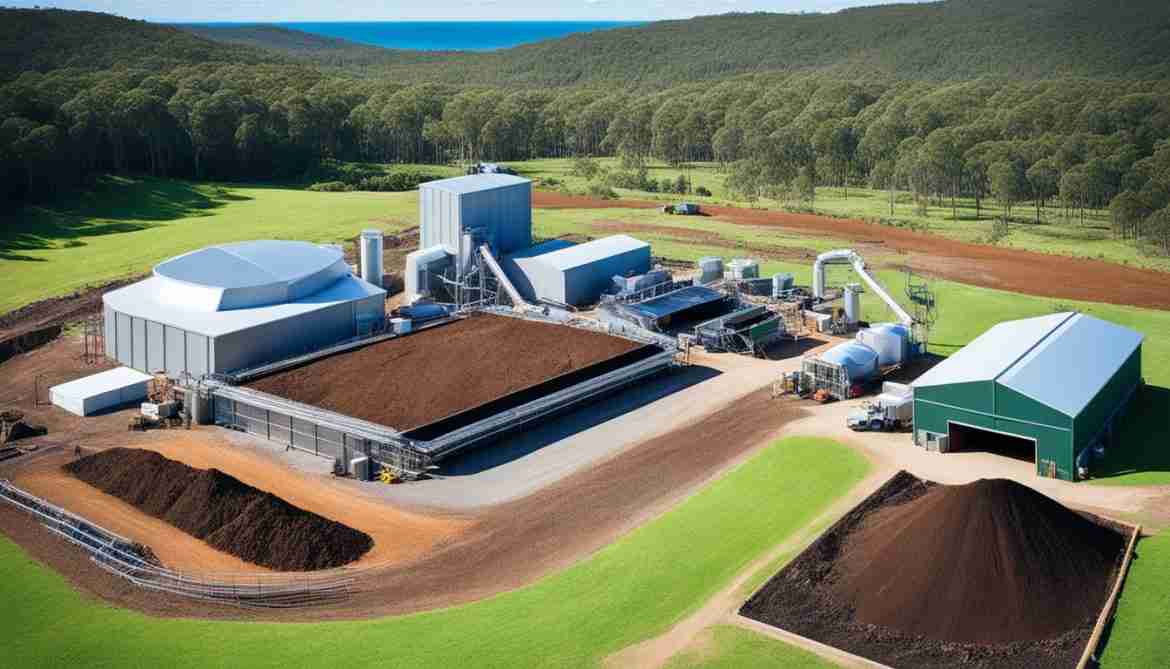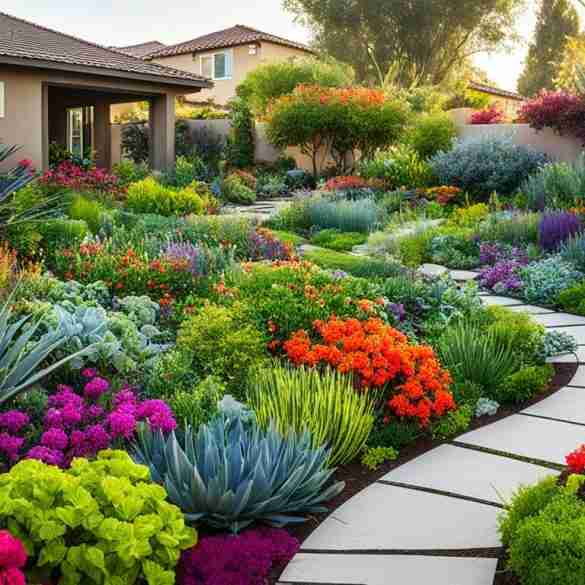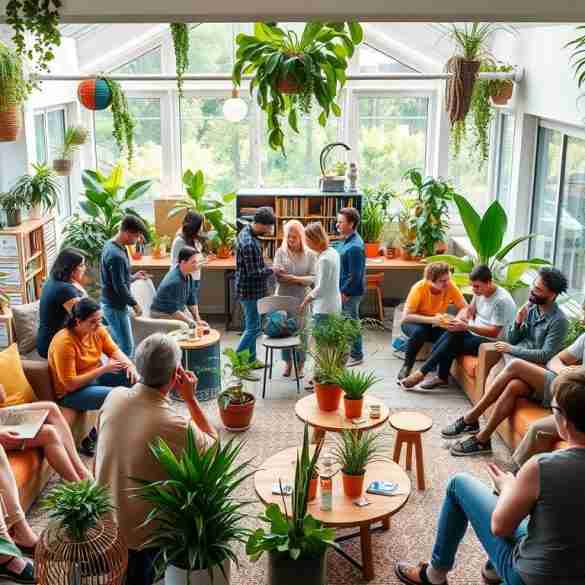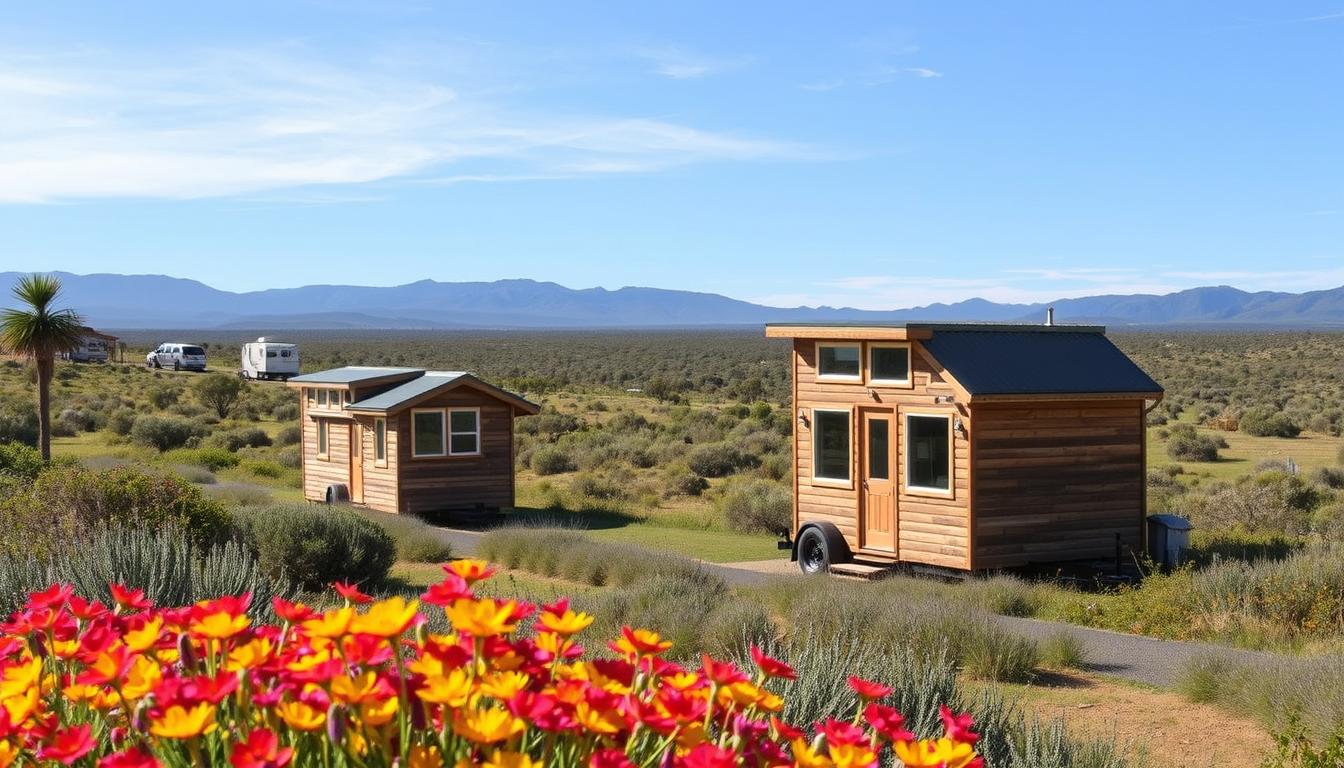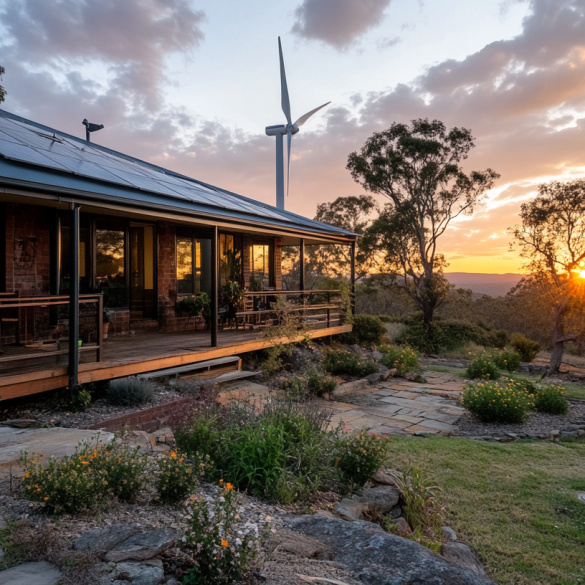Queensland is finding new ways to handle its organic waste and protect the environment. Composting is a big part of this effort. Every year, composting turns over a million tonnes of waste into soil helpers.
This process keeps waste out of landfills and helps the planet. It’s a big step towards a greener future for Queensland.
In Brisbane, the city council gives rebates for composting and recycling food waste. Households can get up to $100 for composters and $200 for recycling gear. This encourages people to recycle more.
By giving money back, Queensland is helping its people compost more. This helps the state meet its green goals.
Composting does more than just reduce waste. It makes a special kind of soil that helps plants grow strong. This soil is great for farms, gardens, and landscaping.
By composting, Queensland tackles waste and creates jobs. It also opens up new markets and products in composting.
Key Takeaways
- Composting is key for managing waste in Queensland. It keeps waste out of landfills and makes soil better.
- Brisbane City Council gives rebates for composting and recycling to encourage people to do it.
- Composting makes a special soil that helps plants and gardens.
- It also creates jobs and new products in the composting industry.
- Queensland is serious about composting to be more eco-friendly.
The Importance of Sustainable Waste Management in Queensland
Queensland produces a lot of waste, over 32 million tonnes a year. It’s the top waste producer per person in Australia. Only about a third of the waste that can be recycled is actually recycled. The state wants to cut waste by 400 kilograms per person by 2020 and reduce total waste by more than two million tonnes.
Composting is key to reaching these goals. It helps make a circular economy. Composting turns organic waste into something useful, like soil that helps plants grow.
Composting is good for the earth. It cuts down on landfill waste and lowers harmful gases. By making compost, Queensland can use waste in a better way. This helps make soil better for plants and supports a future with less waste.
Getting people involved is important for managing waste well in Queensland. Teaching people about composting helps them reduce waste and recycle more. This brings communities together and makes everyone feel responsible for the planet.
| Waste Stream | Recycling Rate Target by 2050 |
|---|---|
| Municipal Solid Waste (MSW) | 70% |
| Commercial and Industrial (C&I) | >65% |
| Construction and Demolition (C&D) | >80% |
| Overall | 75% |
Queensland aims to reduce household waste by 25% by 2050. It wants a 90% waste recovery rate and 75% recycling across all waste types. Composting is a big part of this plan. By supporting composting, the state can create jobs and lessen its environmental impact.
Improving how organic materials are managed is one of the foundation measures identified in Queensland’s Waste Management and Resource Recovery Strategy.” – Sustainable Home Magazine
As Sustainable Home Magazine says, managing organic waste well is key to Queensland’s waste strategy. Using composting for organic waste helps the state meet its recycling goals. This makes a better future for everyone in Queensland.
Understanding Composting as a Waste Management Solution
Composting is key in Queensland for managing waste sustainably. It helps the environment and cuts down on carbon emissions. By learning about composting, you can help the planet and lower your waste.

What is Composting?
Composting turns food scraps, yard waste, and paper into a soil booster. It uses tiny helpers like bacteria and fungi to break down the materials. This happens when they have the right mix of oxygen, moisture, and warmth.
To compost well, mix green and brown materials together. The right mix has a lot of carbon and a little nitrogen. Keeping it moist and well-aired helps too. Aim for a moisture level of 40-60% and temperatures between 54-65°C.
Benefits of Composting for the Environment
Composting is great for the planet. It keeps organic waste out of landfills, cutting down on methane gas. Methane is a strong greenhouse gas that harms the environment.
Using compost also saves natural resources. It makes soil better by improving its structure and ability to hold water. This means you use fewer chemicals in farming, which is good for the earth.
Composting also reduces waste. It means less trash ends up in landfills. This helps protect nature and lowers the harm from waste disposal.
By 2030, Queensland aims to halve the amount of food waste generated, divert 80% of organic material from landfills, and achieve a minimum 70% recycling rate for organics.
Using composting is key to reaching these goals. It’s vital for a greener future in Queensland.
Queensland’s Organic Waste Generation and Composition
Queensland faces big challenges in managing its organic waste. In 2018-19, 42.9 million tonnes of organic material were made. This shows we need strong green initiatives and composting systems in Queensland. Sadly, organic waste makes up about half of what Queenslanders throw away each week. This is a big problem for environmental conservation in Queensland.
When organic waste goes to landfills, it breaks down and makes methane. Methane is a strong greenhouse gas, 28 to 36 times worse than carbon dioxide. This fact shows why we must stop sending organic waste to landfills. We need to use sustainable ways to manage waste, like composting.
The Queensland Organics Strategy 2022-2032 has a big goal. It aims to cut food and organic waste in half by 2032. This plan will get support from the Recycling and Jobs Fund for ten years. It will help grow the organics reprocessing industry in Queensland.
The Organics Action Plan wants to cut household food waste in half. It also aims for a 10% less food waste in the red-lid bin by 2025.
We will check how well these plans work by doing surveys and audits. We will also teach 80% of Queensland schools by 2030. This will help train a new generation to care for the environment.
| Statistic | Value |
|---|---|
| Organic material generated in Australia (2018-19) | 42.9 million tonnes |
| Proportion of waste discarded by Queenslanders that is organic | Approximately 50% |
| Global warming potential of methane compared to carbon dioxide | 28 to 36 times greater |
| Queensland Organics Strategy target for reducing food waste and organic waste to landfill | 50% reduction by 2032 |
| Organics Action Plan target for reducing household food waste | 10% reduction in kerbside red-lid bin by 2025 |
We need everyone to work together to meet these goals. This includes governments, industries, and the community. Important areas for success are Education and Behaviour Change, Infrastructure and Services, Market and Product Development, and Data Regulation and Enforcement.
By using good composting systems in Queensland and supporting green initiatives, we can cut down organic waste. This will help reduce greenhouse gas emissions and protect environmental conservation in Queensland.
Queensland’s Regulatory Framework for Composting Facilities
Queensland is leading the way in green initiatives, especially in waste management. The state sees composting as a key way to handle organic waste and cut down on greenhouse gases. To help composting grow safely and well, Queensland has set up a strong set of rules.
Environmental Protection Act 1994 (EP Act)
The Environmental Protection Act 1994 (EP Act) is the main law for managing the environment in Queensland. It says composting places must get an environmental authority to work. This authority comes with rules like:
- Doing an environmental impact study
- Creating an environmental management plan
- Showing they meet environmental standards and guidelines
The DES can check if composting places follow these rules. This makes sure they work in a way that’s good for the environment.
New Regulations for Composting Facility Standards
Recently, Queensland has brought in new rules for composting places. These aim to lessen the smell problems for people living nearby. Now, new or bigger composting places near homes might need special systems to cut down on smells.
These systems help keep smells from leaving the site and bothering people. This shows Queensland’s effort to support composting while keeping residents happy.
| Regulatory Requirement | Description |
|---|---|
| Environmental Authority | Composting places need an environmental authority to legally work in Queensland. |
| Odor Control Measures | New or bigger composting places near homes might have to use special systems to reduce smells. |
| Monitoring and Reporting | Composting places must check and report on their environmental impact, like smell levels and standards. |
Queensland’s strong rules for composting help green programs like local composting grow. They make sure these programs are good for the environment and the community.
Best Practices for Composting Operations in Queensland
Composting is key to managing waste and cutting down on environmental harm in Queensland. By using best practices, composting sites can work better, reduce smells, and make good compost. The Best Practice Environmental Management Guideline for ERA 53(a) helps operators manage risks and meet goals under the Environmental Protection Act 1994 (EP Act).
Feedstock Management and Odor Control
Choosing and mixing feedstocks right is vital for good composting and less smell. Composting sites should pick and blend feedstocks for the best carbon-to-nitrogen ratio and moisture. For example, a project on Karragarra Island used 130 kg of food waste daily, mixed with leaf litter at 4:1, and composted for 7 months well.
To fight smells, composting sites should use good aeration like turning piles often and forced aeration. Covering piles with compost or biofilters also helps. Operators should check smells often and fix problems fast.
Monitoring and Testing for Contaminants
Checking and testing often is key to making sure compost is safe and quality. Composting sites need a good monitoring plan to watch temperature, moisture, and pH.
Testing for things like heavy metals and germs is important to follow rules and keep people trusting the compost. The Best Practice Environmental Management Guideline says to check for per- and polyfluoroalkyl substances (PFAS) often.
| Parameter | Monitoring Frequency | Testing Method |
|---|---|---|
| Temperature | Daily | Probe thermometer |
| Moisture Content | Weekly | Oven drying method |
| pH | Weekly | pH meter |
| Heavy Metals | Quarterly | ICP-MS |
| Pathogens | Quarterly | Microbiological testing |
| PFAS | As required | LC-MS/MS |
By following best practices in managing feedstocks, controlling smells, monitoring, and testing, composting sites in Queensland can work well and lessen environmental harm. These steps help with waste disposal, household composting solutions, and food waste reduction strategies across the state.
Composting Methods Suitable for Queensland’s Climate
Queensland’s climate is great for composting. It lets people do eco-friendly things that help the soil and cut down on waste. You can compost whether you have a big backyard or a small apartment.

If you have a big outdoor area, you can try traditional composting. This means making a pile of organic stuff on the ground or using a compost bin. These methods are great for turning garden waste and food scraps into compost for your garden.
For those with little space or who want quick composting, compost barrels or tumblers work well. These systems let you chop up food and garden stuff fast. Turning them regularly helps them break down faster, giving you compost quicker than traditional ways.
For people living in apartments or with little outdoor space, worm farming is a good choice. Worm farms use worms to compost waste. They make a special compost and fertilizer that’s good for plants. It’s quiet, easy to keep up, and works well inside, making it easy for everyone in Queensland to do.
“Composting is a simple and effective way for every Queenslander to contribute to a more sustainable future. By choosing a composting method that suits your lifestyle and available space, you can play a vital role in reducing waste and nurturing our environment.” – Sustainable Home Magazine
To make composting work, mix green and brown materials. Green stuff like fresh fruits and veggies, and brown stuff like dry leaves and paper. The right mix helps things break down well and stops bad smells or slow composting.
| Composting Method | Suitable For | Key Benefits |
|---|---|---|
| Heap Composting | Garden waste | Simple, low-cost, ideal for large quantities |
| Compost Bin | Garden waste and food scraps | Contained, neat appearance, easy to manage |
| Compost Barrel/Tumbler | Chopped food and garden materials | Accelerated decomposition, space-efficient |
| Worm Farm | Food scraps, suitable for small spaces | Compact, odorless, produces vermicompost and liquid fertilizer |
Choosing the right composting method and joining community composting helps Queensland go green. It makes our environment better and our soil healthier. Let’s all compost and see the good it does for our planet.
Community Engagement and Education on Composting
Getting communities involved and teaching them is key to better waste management in Queensland. By getting people to compost, we can cut down on trash and help the circular economy. Queensland is working hard to teach people and give them tools for composting at all levels.
Encouraging Household Composting
Composting food scraps and garden clippings helps households lessen their environmental footprint. The Queensland government and local councils offer classes and resources to help people start composting, no matter where they live. Printable lesson plans and programs from groups like EcoMarines Foundation teach kids about reducing waste, recycling, and composting. This helps them develop good habits for life.
Household composting has many benefits:
- It cuts down on organic waste in landfills
- Makes compost for gardens and plants
- Reduces harmful gases from waste
- Saves money on fertilizers and cuts down on chemicals
Promoting Community Composting Initiatives
Queensland also backs big composting projects for whole communities. Places like schools, offices, and community centers can start composting systems for their waste. The Recycling Hero School Program in Rockhampton is a great example of how schools can go zero waste by working together and getting help from waste experts.
“The program aims for schools to become zero waste communities through long-term commitments and collaboration with Council waste educators for continued support and feedback.”
Big composting projects in communities bring many good things:
- They build a sense of community and shared waste responsibility
- Offer learning chances for students and locals
- Save money on waste disposal for groups
- Make compost for local gardens and parks
By getting communities involved in composting, Queensland is moving forward in its goal to reduce landfill waste and support green practices. Teaching, resources, and support from local groups and governments are vital for these projects to succeed.
Sustainable Waste Management and Composting systems in Queensland
Queensland is leading the way in sustainable waste management and composting. By using eco-friendly solutions, setting up composting hubs, and reducing landfill waste, the state aims for a greener future.

The Queensland government works with experts and groups to manage organic waste better. Johannes Biala, an expert with 30 years of experience, helps lead these efforts. His company, ‘The Organic Force,’ works with others to improve composting and use compost in farming.
Local governments, organics processors, and farmers are working together in Queensland. For example, Redland City Council, Healthy Land & Water, and Sunshine Coast farmers are creating groups to use recycled organics better.
“Addressing climate change is a key driver of improved waste management in Australia, and closing the loop, moving towards a more holistic resource management system, is seen as the way of the future.” – Johannes Biala
Queensland is also investing in composting and reducing landfill waste. In 2020-21, almost 2.8 million tonnes of waste was kept out of landfills. This includes over 1.4 million tonnes of paper, packaging, and green waste. Also, 16,900 tonnes of waste was kept out of landfills through ‘tip shops’ and markets.
| Waste Management Statistic | Value |
|---|---|
| Annual waste generated per Australian | 2.7 tonnes |
| Domestic waste collected by weekly general waste kerbside services | 1.42 million tonnes |
| Households served by weekly general waste kerbside services | Over 2 million |
| Materials recovered in 2020-21 processed in Queensland | 79.5% |
| Diverted materials sent interstate for further processing | 8.1% |
| Diverted materials sent overseas for further processing | 12.5% |
Queensland uses technologies like anaerobic digestion and composting to manage organic waste. This reduces greenhouse gases and recovers nutrients and energy. It also cuts down on fossil fuel use and industrial fertilizers, and returns organic matter to the soil. This supports a sustainable and circular economy.
Economic Benefits of Composting for Queensland
Composting is good for the environment and also helps the economy in Queensland. It turns organic waste into compost, creating jobs and helping the economy grow. By using composting, Queensland can reduce waste and make new markets.
Job Creation in the Composting Industry
The composting industry can create many jobs in Queensland. As people want more sustainable waste solutions, the need for composting workers grows. Jobs range from running facilities to collecting and moving waste.
This industry also helps local businesses by needing things like equipment and services. So, it makes the local economy stronger.
Potential for New Markets and Products
Composting leads to new markets and products. The compost is great for farming, gardening, and fixing soil. This means Queensland can attract companies that make sustainable products.
It can also sell compost to other places, making more money for the state.
| Economic Benefit | Description |
|---|---|
| Job Creation | The composting industry can generate employment opportunities in facility operations, collection, transportation, and related services. |
| Local Economic Stimulation | Composting facilities support businesses that supply equipment, materials, and services, boosting local economies. |
| New Markets and Products | Compost can be used in agriculture, horticulture, landscaping, and soil remediation, creating opportunities for businesses and entrepreneurs. |
| Export Potential | Queensland can explore opportunities to export high-quality compost to other regions, expanding its economic reach. |
By focusing on composting, Queensland can lead in sustainable waste management. Investing in composting and promoting it at home helps the environment and grows the economy. It also makes the composting industry strong in the state.
Challenges and Opportunities for Composting in Queensland
Composting in Queensland has both ups and downs for waste management. It’s good for the planet but has some hurdles. These need to be tackled with good management and following Queensland composting regulations.
One big issue is odors and contamination. If not handled right, composting can harm the environment and people nearby. To fix this, rules and best practices help composting be safe and green.
Queensland also faces a problem with not having enough capacity to process organic waste. Five out of eight areas can’t hit the goal of recycling 70% of organic waste by 2030. We need more investment in infrastructure and tech to grow composting.
“High contamination rates reduce the chances of reusing material, with even 2% contamination leading to landfill disposal.” – Australian Organics Recycling Association
But, Queensland also sees big chances to use organic waste better. With over a million tonnes of organic waste each year, green waste processing and food waste diversion methods could lessen waste’s harm and open new economic doors.
| Opportunity | Description |
|---|---|
| Resource Recovery | Investing in modern facilities aims to cut down landfill waste and help Queensland go zero-waste. |
| Job Creation | The composting industry could create new jobs, improve skills, and boost regional areas in Queensland. |
| New Markets | Creating sustainable industries can lead to economic gains and new markets for composted products. |
Working together is key to making the most of these chances and solving problems. The government, councils, and industry must collaborate. With the right infrastructure and education, Queensland can meet its waste goals and move towards a circular economy.
Future Outlook for Sustainable Waste Management and Composting in Queensland
Queensland is focusing on environmental sustainability. The state has a new plan for waste and composting from 2022 to 2032. This plan aims to change how we handle organic waste in the next ten years.
The plan includes investing in new composting tech and facilities. The government is giving a lot of money for this. They want to build municipal composting facilities with the latest technology. These will make compost from organic waste efficiently.
Queensland’s Organics Strategy 2022-2032
The strategy has big goals for cutting down organic waste in landfills. By 2030, the state wants to:
- Reduce organic waste sent to landfills by 50%
- Boost recycling of organic waste to 80%
- Create a network of composting hubs
- Get more people to use residential composting programs
To meet these goals, the strategy calls for working together. It will involve local governments, businesses, and the community. It also plans to teach people about recycling and composting.
Investing in Infrastructure and Technology
The government is putting a lot of money into this plan. Some key projects include:
| Initiative | Investment |
|---|---|
| Regional Waste and Resource Recovery Management Plan (North-West Queensland) | $300,000 |
| Regional Waste Management Plan Coordinators | $7 million |
| Food Organics and Garden Organics (FOGO) Collection Services (Mt Isa and Cloncurry) | Benefits over 9,500 households |
| Capping and Closure of Landfills, Construction of New Transfer Stations (North-West Queensland) | 14 landfills to be capped and closed |
This money will make composting better and create jobs in recycling. Last year, recycling helped Australia’s economy by almost $19 billion and gave over 94,000 people jobs.
Queensland is leading the way in environmental sustainability. By investing in new tech and engaging with the community, it’s making a greener future possible.
Conclusion
Sustainable waste management is key in Queensland. Composting systems help solve the state’s organic waste recycling problems. Almost half of Australia’s household waste is organic. Composting can turn this waste into soil that’s full of nutrients.
This can help reduce greenhouse gas emissions. Food waste in landfills in Australia creates nearly eight million tonnes of carbon dioxide each year. By using composting, Queensland can cut down on these emissions.
Queensland aims to increase waste diversion and recycling. It needs to focus on building strong composting infrastructure. It should also push for sustainable waste management practices. The Environmental Protection (Composting Facilities) Amendment Regulation helps with this. It makes sure composting is done right.
Working together is key to success. Government agencies, industry, and communities must collaborate. This will help Queensland’s composting efforts.
Education and community involvement are crucial. They help people learn about organic waste recycling and composting. By giving people the right knowledge and tools, Queensland can become more sustainable. It can reduce its use of landfills.
With the right policies, infrastructure, and support, Queensland can lead in sustainable waste management. It could be a model for other places in Australia and around the world.
FAQ
What is composting and how does it benefit the environment?
Composting turns organic stuff like leaves and food scraps into a fertilizer. This helps soil and plants grow. It also cuts down on landfill waste and greenhouse gases. Plus, it makes a sustainable resource for gardens, saves water, and helps communities.
How much organic waste is generated in Queensland each year?
In 2018–19, Australia made 42.9 million tonnes of organic waste. This shows a big chance to do better with it. Half of what Queenslanders throw away ends up in the trash.
What regulations apply to composting facilities in Queensland?
Composting over 200 tonnes a year in Queensland needs an environmental authority. The Queensland Government has new rules to lessen odour problems near homes. These rules help make sure new or bigger composting places use in-vessel or enclosed systems if they’re near homes.
What composting methods are suitable for Queensland’s climate?
There are many ways to compost, even without a garden. The best method depends on your space and climate. You can compost in Queensland, no matter where you live.
How can the community get involved in composting initiatives?
Everyone can recycle food and garden waste. You can compost in a house, townhouse, or unit. Schools, workplaces, and community places can too. Teaching and giving resources can help more people compost.
What is Queensland’s plan for sustainable waste management and composting in the future?
Queensland has a plan to reduce organic waste and better manage it. The strategy includes investing in new infrastructure and services. It also focuses on market development, data, regulation, and education for better waste and composting systems.
What economic opportunities does composting present for Queensland?
Composting can create jobs and grow the organics industry in Queensland. The strategy aims to make the most of organic materials. This could open new markets and innovative products from recycled organics.
What are some of the key challenges facing composting in Queensland?
Composting has big benefits but also challenges. Managing it well is important to avoid environmental and community issues. With a lot of organic waste, there’s a chance to use it better and reduce landfill waste.

